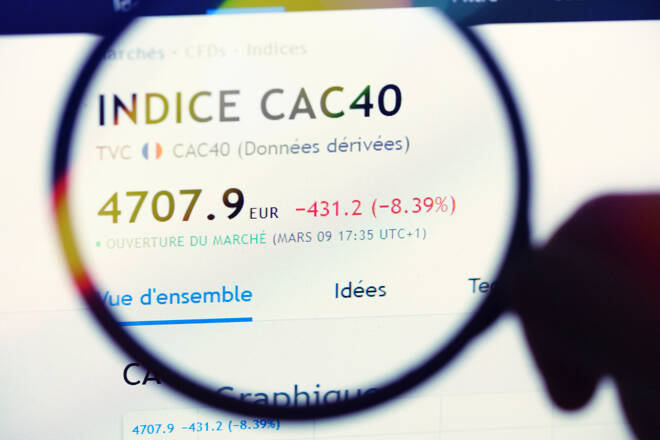Advertisement
Advertisement
European Equities: A Week in Review – 25/03/22
By:
It was a bearish week for the European equity markets. Disappointing economic data and the Russian invasion of Ukraine, coupled with inflation, weighed.
The Majors
It was a mixed week for the European majors in the week ending 25th March.
The EuroStoxx600 slipped by 0.06%, with the CAC40 and the DAX ending the week down by 1.01% and 0.74%, respectively.
Disappointing economic data from the Eurozone, surging crude oil prices amidst inflation concerns, and hawkish Fed Chair Powell chatter contributed to the losses.
Russia’s continued bombing of civilian sites in Ukraine remained market negative, with the ECB highlighting the downside risks of the invasion to the Eurozone economy.
The Stats
Prelim private sector PMI figures for France, Germany, and the Eurozone were in focus on Thursday.
While the PMIs came in ahead of forecasts, private sector activity grew at a slower pace in March. The Eurozone’s composite PMI fell from 55.5 to a 2-month low of 54.5. Weighing on private sector activity was the manufacturing sector. The Eurozone’s manufacturing PMI fell to a 14-month low of 57.0.
On Friday, German business sentiment figures also disappointed, with the manufacturing sector weighing on headline figures. The IFO Business Climate Index fell from 98.5 to 90.8. While current sentiment remained resilient, the expectations indicator tumbled from 98.4 to 85.1.
From the ECB, the Economic Bulletin added to the doom and gloom, with the ECB highlighting uncertainty ahead and risks to the economy tilted to the downside.
From the U.S
It was a mixed week on the economic data front. Core durable goods and consumer sentiment were disappointing, while private sector PMI and labor market numbers were upbeat.
According to prelim figures, the U.S Services PMI rose from 56.5 to 58.9, with the manufacturing PMI up from 57.3 to 58.5. In the week ending 18th March, jobless claims fell back to sub-200k levels, also market positive.
Core durable goods orders fell unexpectedly, however, with consumer sentiment waning in March.
On the monetary policy front, Fed Chair Powell took a hawkish stance on interest rates. Early in the week, Powell talked of a willingness to take a more aggressive rate path to curb inflation.
The Market Movers
From the DAX, it was a mixed week for the auto sector. Continental and Volkswagen ended the week with losses of 3.57% and 1.78%, respectively. BMW rallied by 2.62%, however, with Daimler ending the week up 0.93%.
It was another bullish week for the banking sector. Deutsche Bank rallied by 5.75%, with Commerzbank gaining 2.29%.
From the CAC, it was a bearish week for the banks. BNP Paribas led the way, sliding by 6.28%, with Soc Gen and Credit Agricole seeing losses of 3.02% and 1.93%, respectively.
Things were also bearish for the French auto sector. Stellantis NV and Renault ended the week down 1.53% and 1.33%, respectively.
Air France-KLM and Airbus rose by 2.90% and 1.32%, respectively.
On the VIX Index
It was a third consecutive week in the red for the VIX in the week ending 25th March, marking the fourth decline in six weeks.
Following a 22.37% slide from the previous week, the VIX fell by 12.82% to end the week at 20.81.
4-days in the red from 5 sessions, which included an 8.06% slide on Thursday, delivered the downside.
For the week, the Dow rose by 0.31%, with the NASDAQ 100 and the S&P500 gaining 1.98% and 1.79%, respectively.
The Week Ahead
It’s a relatively busy week ahead on the Eurozone economic calendar. Early in the week, the German economy will draw attention. Consumer confidence figures are due out.
On Thursday, the focus will remain on the German economy. Retail sales and unemployment figures are in focus.
At the end of the week, manufacturing sector PMIs for member states and the Eurozone will also draw more interest.
On the inflation front, prelim March inflation figures for member states and the Eurozone will be key. The markets expect another surge in consumer prices, which will test support for riskier assets.
From the U.S, consumer confidence, ADP nonfarm employment, and Q4 GDP numbers will influence early in the week.
Expect consumer confidence and ADP numbers to be key.
On Thursday, attention will shift to personal spending, inflation, and jobless claims figures.
The key stat of the week, however, will be the nonfarm payroll numbers due out on Friday.
On the monetary policy front, FOMC member chatter will need monitoring.
Away from the economic calendar, Russia’s invasion of Ukraine will remain a key driver in the week.
About the Author
Bob Masonauthor
With over 28 years of experience in the financial industry, Bob has worked with various global rating agencies and multinational banks. Currently he is covering currencies, commodities, alternative asset classes and global equities, focusing mostly on European and Asian markets.
Advertisement
